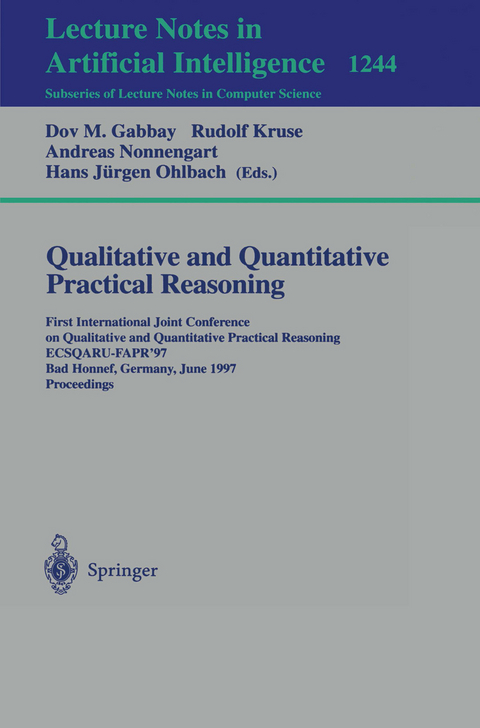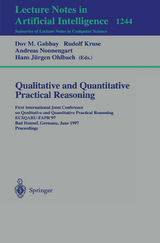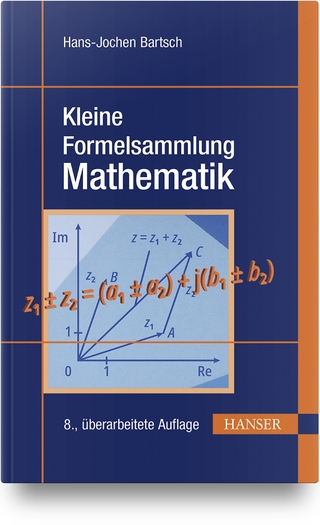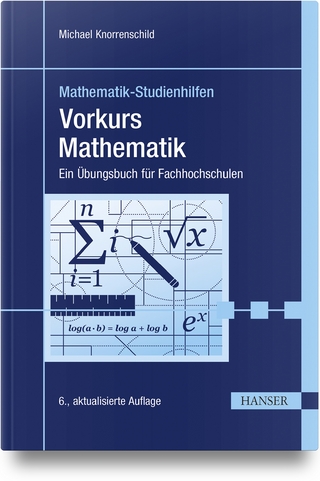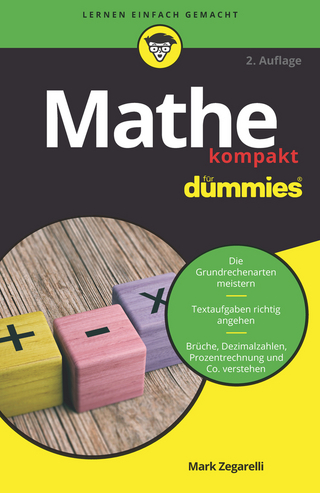Qualitative and Quantitative Practical Reasoning
Springer Berlin (Verlag)
978-3-540-63095-1 (ISBN)
The volume presents 33 revised full papers carefully selected for inclusion in the book by the program committee as well as 12 invited contributions. Among the various aspects of human practical reasoning addressed in the papers are nonmonotonic logics, default reasoning, modal logics, belief function theory, Bayesian networks, fuzzy logic, possibility theory, inference algorithms, dynamic reasoning with partial models, and user modeling approaches.
Prof. Dr. Rudolf Kruse ist Leiter des Lehrstuhls für Neuro-Fuzzy-Systeme an der Universität Magdeburg.
Multisensor data fusion in situation assessment processes.- Dependency mining in relational databases.- Syntactic combination of uncertain information: A possibilistic approach.- A coherence-based approach to default reasoning.- A syntactical approach to data fusion.- Some experimental results on learning probabilistic and possibilistic networks with different evaluation measures.- Information fusion in logic: A brief overview.- Focusing vs. belief revision: A fundamental distinction when dealing with generic knowledge.- Background and perspectives of possibilistic graphical models.- Checking several forms of consistency in nonmonotonic knowledge-bases.- The ?-junctions: Combination operators applicable to belief functions.- Just how stupid is postmodernism?.- Integrating preference orderings into argument-based reasoning.- Assumption-based modeling using ABEL.- Propositional quantification for conditional logic.- Fast-division architecture for Dempster-Shafer belief functions.- Graduality by means of analogical reasoning.- Reasoning about unpredicted change and explicit time.- Non-elementary speed-ups in default reasoning.- A compositional reasoning system for executing nonmonotonic theories of reasoning.- Structured belief bases: A practical approach to prioritised base revision.- Entrenchment relations: A uniform approach to nonmonotonicity.- A modal logic for reasoning about knowledge and time on binary subset trees.- How to change factual beliefs using laws and dependence information.- Using default logic for lexical knowledge.- A layered, any time approach to sensor validation.- TreeNets: A framework for anytime evaluation of belief networks.- A logically sound method for uncertain reasoning with quantified conditionals.- Belief functions with nonstandardvalues.- Error tolerance method in multiple-valued logic.- Representing and reasoning with events from natural language.- Reasoning about security: A logic and a decision method for role-based access control.- Process modeling with different qualities of knowledge.- A Fuzzy analysis of linguistic negation of nuanced property in Knowledge-Based systems.- Normative argumentation and qualitative probability.- Towards a formalization of narratives: Actions with duration, concurrent actions and qualifications.- Multiple subarguments in logic, argumentation, rhetoric and text generation.- Cactus: A branching-time logic programming language.- Creating prototypes for fast classification in Dempster-Shafer clustering.- Probabilistic default logic based on irrelevance and relevance assumptions.- Logic for two: The semantics of distributive substructural logics.- Multivalued extension of conditional belief functions.- Combining evidence under partial ignorance.- Rational Default Quantifier Logic.- Disjunctive update, minimal change, and default reasoning.- Toward a uniform logical representation of different kinds of integrity constraints.
| Erscheint lt. Verlag | 28.5.1997 |
|---|---|
| Reihe/Serie | Lecture Notes in Artificial Intelligence | Lecture Notes in Computer Science |
| Zusatzinfo | X, 626 p. |
| Verlagsort | Berlin |
| Sprache | englisch |
| Maße | 155 x 235 mm |
| Gewicht | 825 g |
| Themenwelt | Mathematik / Informatik ► Informatik |
| Mathematik / Informatik ► Mathematik ► Allgemeines / Lexika | |
| Schlagworte | algorithms • Bayesian Network • Dynamic Reasoning • Dynamisches Schließen • fuzzy • Fuzzy Logic • Hardcover, Softcover / Informatik, EDV/Informatik • HC/Informatik, EDV/Informatik • Knowledge-Based Reasoning • Künstliche Intelligenz • Logic • Logik • Logischer Schluss • Modal Logic • Nichtklassische Logiken • Nonclassical Logics • Practical Reasoning • Praktisches Schließen • uncertain information • Unsichere Information • Wissensbasiertes Schließen |
| ISBN-10 | 3-540-63095-3 / 3540630953 |
| ISBN-13 | 978-3-540-63095-1 / 9783540630951 |
| Zustand | Neuware |
| Haben Sie eine Frage zum Produkt? |
aus dem Bereich
